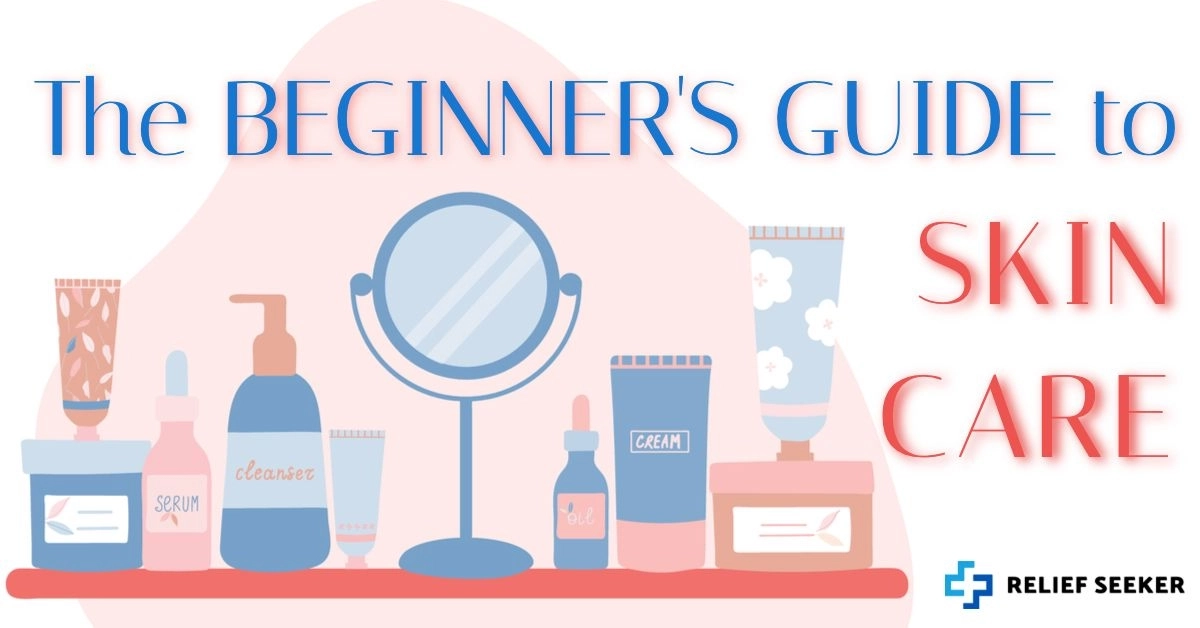Your skin is anything but basic; this doesn’t mean that your skin care routine needs to be some extravagant, super time-consuming thing. And depending on who you ask, having a skin care routine could mean anything from slapping on some moisturizer when you remember to a strict, 20 step daily and nightly regime.
Truth be told, each skin care routine is just as unique as the person following it (or trying their best to, anyway). Skin care has become trendier in the past decade, with social media influencers posting their “how-to” videos and the Kardashian sisters putting out beauty lines that sold out in a matter of seconds. This hasn’t necessarily made things easier for the average consumer. In fact, it seems to have gotten a bit more intimidating and confusing, especially for a beginner.
Yes, there are YouTube tutorials and a million articles that can be referenced, but really, who has time for all that?
This is where we come in! We will make it super simple for you to embark on a basic skin care journey and will (gulp, hopefully) answer any skin care 101 questions you might have. Read on to get the skinny on what your epidermis needs to shine bright like a diamond.
What Does Skin Care Mean?
First things first, when we mention skin care, we mean the act of caring for your skin; for example, Julie is very meticulous about her skin care. Whereas, when we mention skincare (one word), we’re referring to the products used and the ingredients that comprise those products.
Quick reference guide:
Skin care = how you care for your skin
Skincare = products or ingredients
Cool, cool, cool, now that we’ve got that out of the way, let’s get down to business!
Skin care at its root means the primary care of your largest organ; your skin! It possibly plays the most critical role in protecting you from the nasty things floating around in the air from attacking your insides. It also holds all your internal organs, ummm, in place, so at the very least, we owe our skin at least some basic attention to keep it from shriveling up. Just as your skin protects you, you should also want to show some mutual admiration and protect it, mostly from developing skin cancer, but also from the elements, such as the sun and harsh weather.
Is Skin Care Really Necessary?
Let’s think about this for a hot second. If we compare skin care to, say, dental hygiene, what’s the first thing you think about when it comes to basic oral care? Brushing your teeth, right? Well, if you don’t brush your teeth regularly, your teeth could become rotten and fall out. The same goes for your skin. No, your skin most likely won’t fall off if you don’t properly care for it, but it won’t look its best. Showing your skin at least some love has both medical and cosmetic benefits.
Unfortunately, at this point, no one has successfully invented the time machine, and even though you can’t slow down the hands of time, you can begin a basic skin care regimen that might be able to help you reduce the appearance of many skin conditions, such as fine lines, wrinkles, and dark spots. Treating your skin like the queen (or king) she/he is can also help regulate minor skin concerns, like bacteria that causes acne, oiliness, or dryness.
When thinking about skin care, one thing to keep in mind is the type of skin you have or if you have specific skin conditions, such as eczema, psoriasis, or hyperpigmentation. For those with unique skin conditions or concerns, a basic skin care routine may not be the best idea, as these things generally require a bit more thought. For instance, if you have acne-prone skin, you probably don’t want to use an oil-based moisturizer, which could exacerbate the problem, leading to more unwelcome pimples popping up. That said, finding a skin care routine that works for you can offer many beneficial ways to manage and treat your skin conditions (more on this later).
Having a skin care routine can also be great for your mental health. There are so many benefits to taking a few minutes out of your day solely for you. Some call it ‘me time,’ others call it self-care. Whatever you call it, having a routine might help you get to a place where you believe it easy to do nice things for Y-O-U. This can ultimately lead to aiding in building healthy habits in other areas of your life. Who knows, you could start a new skin care regimen tomorrow and realize your true calling isn’t in the financial world; it’s really in making pottery.
Lastly, practicing skin care can be cathartic. Many people find that having a daily routine, skin care or otherwise gives them a sense of control. It helps them relax after a long day of distance learning or from being at the office. And, we all know that we deserve to feel good at the end of the day, even if it’s only for a few minutes.
Let’s Talk Types of Skin
As promised, let’s talk more about skin types. Because, as we mentioned above, before you figure out the do’s and don’ts of your skin care routine, you’ll want to know the type of skin you have or if you have any underlying concerns to keep in mind before buying skincare products that have been recommended by friends or even celebrities.
Think about it this way -- you’re freshly showered and aren’t planning on applying anything to your face. How does your skin react after a couple of hours? If it gets dry or feels rough in some spots, you probably have dry skin. If it feels or looks shiny, you most likely have oily skin. If it’s neither, well, congratulations, you’ve got “normal” skin. Knowing how your skin reacts to the elements when it’s bare is a good indicator of the type of skin you have and can help steer you down the right aisle at Sephora.
If you’re already using certain skincare products and your skin has become irritated or red, you might be allergic to those products and probably want to discontinue using them. This generally means you have sensitive skin or some other skin condition and will want to think about talking to a dermatologist. Or, at the very least, be extra cautious when selecting products that don’t cause your skin to become red or irritated.
Wait, did we say talk to a dermatologist? Yes, we did. However, you don’t necessarily always need to speak to a dermatologist before starting a new skin care routine. But, if you have sensitive skin, skin conditions or want to address any significant concerns, such as rosacea or eczema, we recommend checking in with someone who knows what they’re talking about. We’ve done extensive research in this department and have compiled a list of online doctors to help you figure out your skin care concerns.
What is a Basic Skin Care Routine?
As we mentioned before, skin care isn’t complicated; if you don’t want it to be. There are three simple steps of any basic skin care routine.
Cleansing
Moisturizing
Sunscreen
Cleansing
This is probably the most crucial step, as it is the step where you’re setting your skin up for a successful day or restful night. You’ll want to wash your face at least once a day, but ideally twice, and choose a cleanser that doesn’t leave your skin feeling tight (this can cause fine lines, eeeeek!) Try your best to avoid washing your face until it’s squeaky clean; this means you’ve washed all the good/natural oils right down the drain.
One cleanser that we like a lot is Musely’s Daily Cleanser. It’s effective for all skin types and contains cucumber and kiwi to clean out your pores and leaves your skin hydrated.
Moisturize
No one likes their face to feel dry or scratchy, amiright?! Moisturizer helps prevent wrinkles, such as crow’s feet, and keeps your skin hydrated throughout the day. Even people with oily skin want to use a moisturizer to keep their skin healthy and glowing. Applying moisturizer each time you wash your face will ensure your skin’s elasticity stays intact, and if you can find a moisturizer with added Vitamin C and/or E, you’ll be winning at life. Vitamin C and E are both known to aid in skin regeneration, leaving you with plump and juicy pores.
Sunscreen
Ok, we lied, sunscreen is the most important step of your skin care regimen. Nope, take that back, all three steps are super important, but sunscreen is up there. Sunscreen protects your skin from UV rays and should be applied after your moisturizer. It is recommended to choose a broad-spectrum sunscreen with SPF 30 for the best protection. Wearing sunscreen will not only protect your face from sun damage but will also decrease your chances of getting skin cancer, at least on your face. It is ideal to put sunscreen anywhere on your skin that will be exposed to the sun, but we’re talking about your face right now, so bottom line; wear sunscreen.
There are a lot of moisturizers that have sunscreen built-in, so lucky for you, you may not even have to worry about it, but do keep in mind that sunscreen wears off during the day, especially if you’re outside for a prolonged period of time or are engaging in activities that make you sweat, so keep that sunscreen handy for re-application.
If you’re unsure of where to start, check out Musely’s line of products. Their skin regeneration set includes all the things you need to start your journey to brighter skin and is perfect for beginners.
How Do I Start a Skin Care Routine?
Now that you know the basics of skin care, you’re probably asking yourself, what’s next?
This one is quite simple. Start slow and be as basic as possible. If you get fancy and buy all the exfoliators, serums, and creams, you might get overwhelmed and give up. But, if you start with a basic and simple routine (see above) to see how your skin reacts to something new, you can then start adding the extra products once you’re comfortable and can identify the type of skin you have.
At first, there will be some trial and error as you figure out which products work and which aren’t the best. Try not to get discouraged. As they say, “Rome wasn’t built in a day.” Neither is your perfect skin care regimen.
Treating Specific Skin Conditions
Once you’ve found a basic regimen that works for your skin type, you might want to begin exploring different ingredients in skincare products that treat specific skin conditions. There is a multitude of conditions, so we’re going to highlight the most common conditions that one might deal with or suffer from. These skin conditions can include:
Signs of aging
Acne
Hyperpigmentation
Dry or sensitive skin
Signs of Aging
Everyone ages, but if you don’t take care of your skin early on, you risk seeing signs of aging well before you might want to. Common signs of aging include dark spots, or sometimes referred to as photodamage, fine lines, wrinkles, and sagging skin.
Ingredients to use for signs of aging
Retinoids
As one of the only proven ways to prevent signs of aging, retinoids (a form of vitamin A) work by stimulating the skin cell shedding process, which can lead to smoother skin and dampers the aging process. Retinoids are available in both prescription and over-the-counter (OTC) products. If you’ve already tried the OTC version and want to move on to something a bit stronger, you can find prescription Retinol from the digital clinic, Dear Brightly. Dear Brightly specializes in combating the effects of photoaging by adding Retinoids to your daily skincare routine.
Niacinamide
Also known as a form of niacin (Vitamin B3). This can be applied directly to the skin, and some research suggests that it is helpful in fighting off all signs of aging.
Ceramides
These intercellular lipids fill the space between your skin cells, making your skin look as fresh as the day you were born.
Peptides
Peptides are really where it’s at, and anyone looking to turn back time will want to look for this collagen-boosting amino acid.
Acne
Unless you’re the luckiest person on the planet, we’ve all had acne at one point or another. However, acne can be more complicated than you might think. There are different types of pimples. They can be inflamed, red, painful, or live under the top layer of skin.
There are many options for OTC acne treatments, but if they’re not working, it’s probably best for you to see a dermatologist or an online doctor specializing in skin care who may be able to prescribe you something with more fighting power.
Ingredients to use for acne
Chemical exfoliants
Similar to scrubs or brushes you’d use to exfoliate your body, but much less abrasive, chemical exfoliants, including alpha hydroxy acids and beta hydroxy acids, break down the physical bond between your cells and the dead skin, making it easier to wipe them away and send them down the drain.
Benzoyl peroxide
Mostly used in tandem with salicylic acid to kill acne-causing bacteria, benzoyl peroxide is recommended for those suffering from moderate acne. However, it can be very drying, so it’s important to use a good night cream when using BP. We recommend Rory’s Nightly Defense cream.
Hyperpigmentation
Hyperpigmentation or dark spots can occur in a variety of ways, mostly from exposure to the sun, but also if you have a skin condition, melasma. These conditions can be treated with brightening skincare products that contain vitamin C.
Ingredients to use for hyperpigmentation
Chemical exfoliants (see above)
Retinoids (see above)
Sunscreen
Who knew sunscreen could help with dark spots?! Wearing sunscreen on a daily basis can even help prevent dark spots from staring at your computer and phone, as the blue light can exacerbate hyperpigmentation. It is recommended that you choose a sunscreen containing iron oxides. Hint, hint...tinted sunscreens usually have iron oxides, which is a win, win. A little tint + SPF protection!
Hydroquinone
This ingredient is considered the silver bullet of brightening ingredients and is available OTC and through an online doctor or dermatologist, like Rory, Musely, or Strut.
Dry or Sensitive Skin
Probably one of the most common skin conditions, dry skin is generally categorized as sensitive skin but can also be the more serious skin condition, eczema. So, it’s worth noting that you can’t always use the same products to treat dry skin that you would to treat other sensitive skin conditions, like psoriasis or rosacea.
Ingredients to use for dry or sensitive skin
Hyaluronic acid
Our skin naturally produces this acid. However, people with dry skin may need a little extra to help with the skin's moisture level.
Colloidal Oatmeal
Made from grinding oats and mixing with water, this compound creates a protective barrier on the skin. This ingredient is great because you can mix it up at home as a relaxing face mask or take it in the shower for added exfoliation.
Bakuchiol
Bakuchiol is a plant extract often used as a natural alternative to using retinol, especially for those with super sensitive skin.


